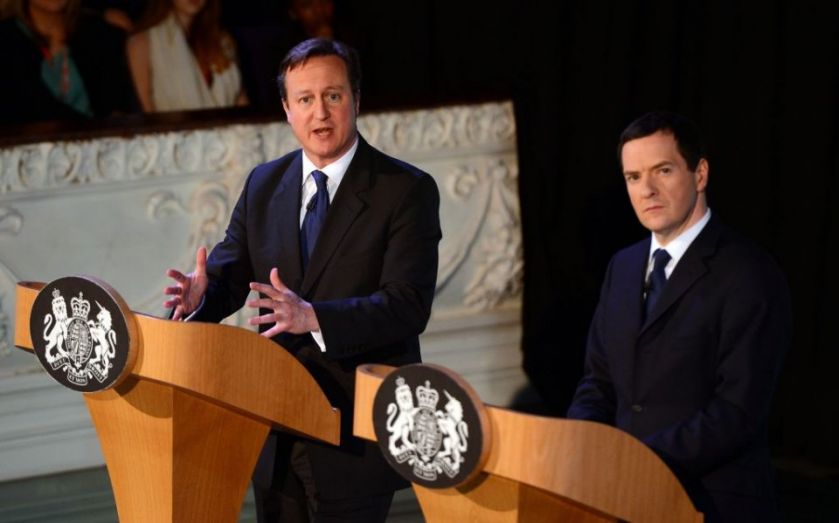How to save £50bn: Bold cuts to state spending will deliver prosperity for all

Shadow chancellor Ed Balls has accused the Conservatives of planning “extreme” spending cuts if they get into Downing Street after the election. But there’s no way we can know whether the Tories’ plans are extreme or not, because they haven’t given any real details on what they will cut or by how much. And Balls’s colleague, shadow chief secretary to the Treasury Chris Leslie, was equally vague about Labour’s own spending intentions in an interview on the Today programme on Monday.
Dealing with what we do know, the Office for Budget Responsibility (OBR) has forecast that public spending as a share of GDP will be 35.2 per cent by 2019-20, down from a level of around 40 per cent now. That is a welcome trajectory. But with the election just around the corner, voters deserve to know what politicians from all parties would do to achieve that goal, or if they would change course.
The TaxPayers’ Alliance has today released The Spending Plan, the first fully-costed programme of the spending reductions needed to reach the OBR’s target.
We have proposed 24 policies that would save £50bn a year by 2019-20. Cutting out waste and improving efficiency are important, but to make savings on that scale, we would need to end entire functions of government. That means removing big departments like Business, Innovation & Skills, Culture, Media & Sport, and Energy & Climate Change, along with many of their agencies. Any necessary functions should be transferred to other departments, such as moving higher education to the Department for Education. Abolishing those three departments could save around £7.5bn a year.
National pay bargaining should also be scrapped to save nearly £6bn a year by 2019-20 – health secretary Jeremy Hunt cannot possibly come up with a single figure to pay every nurse in the country appropriately, so the decision should be taken locally. Further, relaxing planning laws will mean we can cut housing benefit bills by £3.8bn.
A programme of tough spending decisions is important. The government has been slower on deficit reduction than initially promised, and evidence shows that, when fiscal consolidation happens largely on the spending side, it is more successful. For instance, in the 1990s, the Canadian budget deficit fell from 9.1 per cent of GDP to zero in five years; the country then ran surpluses for successive years. This was achieved almost entirely through reductions in public expenditure: between 1992 and 1997, spending fell by 9 percentage points of GDP, while taxes barely rose.
So in addition to showing how the government could bring spending down to the OBR’s figure of 35.2 per cent, The Spending Plan also offers a programme of 41 reductions that would see public expenditure fall to 31.7 per cent of GDP. Crucially, that would allow for tax reform along the lines recommended in the Single Income Tax, the final report of the 2020 Tax Commission that we convened with the Institute of Directors in 2012. With a reduction in spending followed by serious tax reform, the UK would be in a far more stable and sustainable fiscal position. We could also eliminate the myriad exemptions and loopholes that pepper the tax system, and start to rebuild trust in it once more.
Our plan would still include education and healthcare for all, strong defence and justice systems, and a welfare system that provides for those in need, so there is no reason for politicians to baulk at the idea of spending around 32 per cent of GDP. It’s about the same level of spending as in countries like Switzerland, Australia and New Zealand; they are advanced, civilised economies where public services are still delivered to a high standard. Indeed, many readers of this newspaper may have considered moving to these countries, so they can’t be all bad.
As well as spelling out more specifically what they’d do to bring spending down, it would be welcome to hear a politician – any politician – outline a positive vision of what a low tax, low spend Britain would look like. Getting spending under control is about much more than dealing with the deficit; it should be the centre-piece of a big picture strategy. The pitch politicians should make is that getting spending under control would mean lower taxes for families across Britain, less debt for future generations, and faster economic growth, generating prosperity for all. It would be refreshing to hear this in the run-up to the election, to counter all of the promises to spend, spend, spend.
As with any detailed plan, politicians might not agree with every single proposal we have made. But it is incumbent on them to tell the electorate what they would do instead.